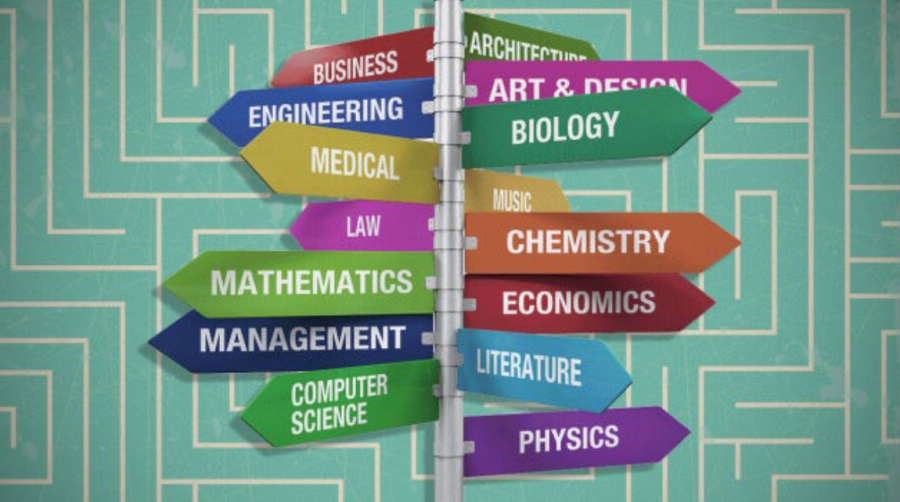The truth behind double majoring at UWL
November 23, 2018
As students at the University of Wisconsin-La Crosse decide which major they want to pursue, some are starting to choose two instead of one. Although the term “double majoring” may sound intriguing, many students question whether or not it is actually beneficial to the success of their careers.
Kimberly Vogt, the Interim Dean of College of Liberal Studies, described the difference between double majoring and majoring with a minor in another subject. She said, “Minors in the College of Liberal Studies are typically 21-24 credits, majors are typically 36-40 credits, so the additional credits are the biggest difference. Another difference is that majors typically include core required classes in the methods and theory of the discipline, as well as a culminating capstone course or project. Most minors do not require such experiences.”
She continued, “My advice to students is always that they try to graduate in four years with as little debt as possible, in a major they are passionate about. In addition, I recommend that as part of their academic experience, they have engaged in what we call high impact practices such as internships, undergraduate research, community-based class projects, and international study abroad. These types of experiences allow students to apply what they have learned in the classroom to address real world problems.”
Vogt added that if the student could double major in the same amount of time as single majoring, it wouldn’t hurt to learn a deeper understanding of a different topic. However, Vogt made it clear that, “employers tell us that they care that the student has a bachelor’s degree, but that the specific degree is not as important as the skills the student brings with them to the workplace, employers are looking for skills such as the ability to bring a project to completion.”
Karolyn Bald, an assistant director with Career Services, agreed with Vogt and said, “Just because you are a business major doesn’t mean you have any more of a chance than a sociology major to get a job in management – it really comes down to what kinds of professional experiences have you had, how you can sell your skills, and then selling to that employer how much you want that job. Most of the time, it’s all about being well rounded, being able to make sound decisions and problem-solve, communicate with people inside and outside of the organization, and being a hard-worker.”
Nicole Wohlrab, an academic advisor at UWL, commented, “In some situations it certainly could [help a student find a job quicker], but I don’t think that is the only way to go. I think students can use co-curricular experiences like student organization work, volunteer opportunities, part time jobs and internships to build their skill set the same way that a double major could.
Although this makes it seem like double majoring isn’t as valued as some might think it is, there may be a rise in the number of students choosing to double major.
Vogt described, “We may be seeing a slight increase in the number of double majors because more students are coming to college with credits they earned while they were in high school. Students who come in with a lot of prior credit may graduate early, but some of these students stay at UWL for four years, completing a second major or spend a semester or two studying abroad, or completing full-time internships away from campus.”
Even though they haven’t seen a huge rise or decline in the number of those who are choosing to double major, it seems as though it is a pretty constant idea among UWL students.
Students at UWL double major in a wide variety of topics such as chemistry and biology, business and finance, English and communication studies, and hundreds of others. As Bald stated, “the possibilities are endless!”
Ben Dumont, junior at UWL, is double majoring in psychology and communication studies. He said, “I chose these because psychology has always been my passion and favorite subject in school. I find psychology topics very interesting and relevant to daily life, and want to be a part of the research on the cutting-edge discoveries. For communication studies, I thought that this would be a good compliment to my psychology major, and really help me with my presentation, speaking, and writing skills. In my future careers, I believe that the ability to communicate effectively will be the top skill that employers will look for, and a communication studies major in my background will really help out.”
He went on to explain that he chose to double major because he could either minor or major in the same amount of time, and he thought majoring would only look better on future applications. He added that majoring in communication studies on top of psychology will help open the doors to a wider variety of jobs than just majoring in psychology.
Mary Franitza, senior at UWL, chose to double major in Spanish and women, gender, and sexuality studies. Explaining why she decided to double major, she said, “With two liberal study degrees, I sought out the best way to use two separate disciplines to fit my academic interests. It really came from considering how I could maximize my time at the university and walk away with a high skill level. Combining the two majors was an easy decision to make, considering the courses and faculty complemented each other well. Often in my Spanish classes I challenged problematic ideas or comments while my women, gender and sexuality studies courses were complemented by my ability to use research in Spanish and pursue my unique research interest of gender in the language classroom.”
When discussing how her double major could help her in the future, Franitza replied, “While job searching and applying to graduate schools remains daunting and a constant battle to prove or justify my education, I believe double majoring has placed me in a position for more success. I have a cross-disciplinary understanding of language and social relationships. I am actively applying what I have learned in the classroom in my work as an immigration intern this semester.
Double majoring definitely has both positives and negatives, but it seems as though one does not significantly outweigh the other. Staff at UWL heavily ask students to consider the time it would take for them to complete their two majors as well as if setting aside time for internships and other volunteer activities would be more helpful for their success. The biggest thing to think about is what would not only complement the degree, but also give experience that future employers would see and desire.
UWL offers many majors and minors for students to choose from and gain extensive knowledge for whichever path they choose in life.






